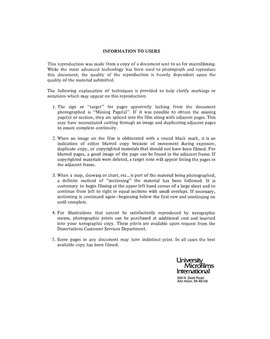| dc.contributor.author | Hwang, Bette K., | en_US |
| dc.date.accessioned | 2013-08-16T12:29:16Z | |
| dc.date.available | 2013-08-16T12:29:16Z | |
| dc.date.issued | 1984 | en_US |
| dc.identifier.uri | https://hdl.handle.net/11244/5287 | |
| dc.description.abstract | This investigation, through a study of effects, examined the impact of combined training phases on the abilities of student teachers to manage the complexity of verbal reinforcements and to demonstrate achievement of comprehension and command growth expectations regarding verbal reinforcements. Subjects were 40 elementary student teachers at the University of Oklahoma who were enrolled in a corequisite course which included approximately 18 hours of training in verbal reinforcements. | en_US |
| dc.description.abstract | The research design was a one-group pretest-post test-post test design. Data were obtained from the responses of subjects to a written, competency based, criterion referenced test designed specifically for this study. The data from the pretest and each subsequent post test were analyzed to respond to four basic research questions. Three questions dealt with the effects of combined training phases on achievement, complexity management, and mastery of growth expectations. The fourth question dealt with the sequence of growth expectations. Three approaches were taken to address these questions: (a) comparison of group mean scores obtained from each test administration, (b) comparison of the proportions of subjects who had attained mastery at the time of each test administration, and (c) comparison of patterns depicting the order of attainment of mastery on each growth expectation for each subject. | en_US |
| dc.description.abstract | Results indicated that training had a positive effect on the achievement of comprehension and command growth expectations. The combination of theory presentation, concept instruction, demonstration, and modeling (Training Phases 1 and 2) had a facilitating effect on achievement of command, but these training phases had their primary impact on comprehension. The combination of practice and feedback (Training Phases 3 and 4) apparently increased achievement on the growth expectation for comprehension as well as for command. Management of the variables (complexity) was positively related to accuracy in recognizing and applying verbal reinforcements (achievement). Statistical analysis of patterns depicting the order of attainment of mastery of growth expectations supported the conclusion that mastery of comprehension was prerequisite to mastery of command. The results of this investigation supported the speculation that the interaction among training phases and growth expectations occurred in a hierarchical order. | en_US |
| dc.format.extent | ix, 139 leaves ; | en_US |
| dc.subject | Education, Teacher Training. | en_US |
| dc.title | Relationships among training phases and growth expectations in the preparation of preservice teachers / | en_US |
| dc.type | Thesis | en_US |
| dc.thesis.degree | Educat.D. | en_US |
| dc.thesis.degreeDiscipline | Jeannine Rainbolt College of Education | en_US |
| dc.note | Source: Dissertation Abstracts International, Volume: 45-08, Section: A, page: 2492. | en_US |
| ou.identifier | (UMI)AAI8425540 | en_US |
| ou.group | Jeannine Rainbolt College of Education | |
